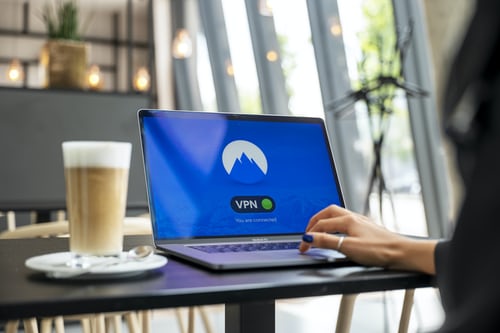12 FEBRUARY 2022
Seven (7) Cyber Security Mistakes That You Should Avoid

Cybersecurity is the practice of using information technology systems and processes to guard networks, data, servers, and devices from unauthorized use and malicious attacks. Nowadays, individuals and organizations constantly fall prey to malicious attacks. It could be that they are unaware that some of their actions present an avenue for these attacks to happen. Considering the rate at which we rely on the internet for almost everything, it may be hard to protect oneself from these attacks. However, it is not impossible. That is why we have outlined seven cyber security mistakes and how you can protect yourself and your business from them.
1. Using Weak Passwords For Your Online Accounts
Now, this particular mistake is common and we get it. Nobody wants to set a password that is lengthy and cannot be easily remembered. But wait a minute, here are two questions you should consider before setting your next password:
- Is your password simple to guess?
- Is it your mother’s maiden name or worse still, your birthdate?
If your answer is yes, then do not panic, you are not alone. Many individuals still use words like "password" or "123456" as their passwords, even in the digital age - funny but true. In other words, the easier your password is to guess, the easier it is for hackers to crack it and compromise your data.
Creating strong passwords is the best option. Try using a minimum of eight characters, combine letters and numbers, use some special characters, and make sure you avoid using personal information.
Tip: Use the “three random words” guideline to create a safe and secure password. It must be simple to remember and random enough to keep the hackers off.
2. Using a Public Wi-Fi
If you’ve seen any of those popular intelligence series on Netflix like "blacklist" where the American actor “James Spader” plays the role of Raymond "Red" Reddington; the know-it-all-intelligence specialist. Chances are you have an idea of the danger of using public Wi-Fi for work-related tasks. Nowadays, public places like airports and train stations offer free Wi-Fi that commuters can easily access.
There is always a security risk with doing work-related tasks in public settings. The problem with this is you are relying on public Wi-Fi for security. In addition, there is a greater chance that you do not know most of the people with access to the same Wi-Fi.
Don't get us wrong: we enjoy free, convenient, and easy-to-use public Wi-Fi too. However, it is exactly these elements that make public Wi-Fi dangerous. Any hacker can employ a "man in the middle" attack to access your data if you're using a public Wi-Fi network.
Avoiding important tasks on public Wi-Fi networks is the best approach to being secure. If necessary, be extra careful by using a VPN to conceal your location. The next time you want to check your office email or company account using public Wi-Fi, think twice.
3. Working with Your Device

Isn't it often enticing to use personal gadgets for business purposes?
Common instances are:
- Using your phone to log into your company bank account?
- Or reading that confidential email that dropped in your office inbox just as you were leaving the office?
Using your own devices usually comes with comfort and convenience.
The problem is doing this daily will expose you to a slew of problems. Remember that whatever you do on the internet will most likely expose you to some level of danger. Plus, let's face it, during our "me time", we're not exactly vigilant with our browsing habits.
So, make it a practice not to mix your personal and professional equipment to prevent these problems. This practice should apply to your staff as well. If you can afford it, provide your staff members with work gadgets.
4. Visiting Untrustworthy Websites
Another easy error to avoid is visiting hazardous websites. This is true regardless of whether you are using a personal or professional device.
Many websites offer links that, if clicked, may install some form of malware on your computer. Your entire firm may be at risk if that gadget connects to your office Wi-Fi. Even if the link leads to an innocent website, the hosting platform may be anything but innocent.
That is why, when it comes to securing company data, remaining protected when browsing the web is crucial. Take a quick look at the address bar whenever you want to access a new website. A green padlock or an "S" next to the "HTTP" element of the URL means the website is safe. It also means traffic to and from the website is encrypted, hence you can input sensitive information. The absence of these two elements from the URL of a website means the website is unsafe.
5. Getting Conned by Phishing Emails
When we think of phishing emails, we instantly remember the case of Sony Pictures in 2014.
A group of criminal hackers known as "Guardians of Peace" sent out phishing emails thought to be from “Apple” to top Sony executives. The email requested for their ID verification and they were re-directed to a phony website that captured their login details. This singular act resulted in a leak of about 100 terabytes of data from Sony Pictures and a whopping loss of 91 million USD. Even the almighty Facebook and Google have fallen victim to phishing emails.
So, what are phishing emails?
Phishing emails are one of the most popular forms of cyber-crime. About three billion phishing emails are sent daily, so you are probably already inundated with them.
Phishing emails are more sophisticated than ever before, which is a problem. The days of receiving an email from a prince off the coast of an exotic island offering infinite riches in exchange for a small amount of money are long gone. Instead, official organizational language is now being used in these communications.
Phishing emails attempt to persuade you to provide personal information. To avoid this, do not open any suspicious-looking emails. If you do, avoid clicking on hidden links or attachments. You have the option to move it to spam or delete it straight away. Fortunately, there are still techniques to spot a phishing email if you pay close attention. They may have foul language, bad spelling, or mistakes that do not add up. Check the email address because it may include random digits or special characters instead of words.
6. Lack of Software Updates On Devices
Let's face it, regular software updates aren't everyone's favorite thing, but they play an important role in keeping us secure. This is especially true for enterprises. A lot of the time, software updates solve security flaws in devices we use daily. These software updates are usually a response to well-known security risks currently being exploited. If you receive an update notification from your trusted provider, do yourself a favor and download it right away. It may put a halt to your work, but it will spare you considerably more costly problems in the future.
7. You believe you are secure.

Many people assume they are unaffected by online attacks. They believe they are insignificant or that their protection is adequate.
Every company or individual is vulnerable to cyber-attacks. Small firms were the targets of more than half of all security breaches last year. The majority of hackers are not selective about who they attack; all they care about is making money. So, they will go for the simplest and easiest targets first, don't let it be you!
That is why, when it comes to cybersecurity, you should never be complacent. Review your security measures occasionally throughout the year and adjust them as needed to ensure that you are protected. It costs a lot more to repair a security breach than to put security measures in place. Costs do not just mean financial terms alone, how about the loss of client data, classified documents, or sensitive information?
Although the basic measures listed above are good, these measures are not sufficient to secure an organization. Let's assume you are security conscious, are your staff members security conscious as well?
For this reason, businesses are advised to adopt more sophisticated levels of protection. This sort of protection has to be tailored to your business needs to guarantee optimum security. In addition, you will need an expert to provide these solutions and deploy them, this is where Techfount Systems come in.
So, how can Techfount help your business?
At Techfount, we provide expert cybersecurity solutions. We are passionate about creating IT solutions that help businesses stay safe and perform better. Our IT solutions protect your systems, programs, and networks from digital attacks. In essence, we secure your business inside out.
As such, we created an innovative solution known as the “Techfount SecureNet Solutions" aimed at providing a 360° security solution for your business. The best part is the plan is customizable and is sure to fit your budget. Currently, we are offering a 20% discount with annual subscriptions. You also get a free consultation and 14 days free trial. Click here to learn more and take advantage of this offer now! Alternatively, you can click here to contact us for more information.
Our Latest Posts
We know IT. In fact, we wrote a blog on it.
Reasons why businesses need Network Firewall Security
Cyber security is a growing concern in this highly advanced age where protecting your business‘s crucial data is more important than ever.
Read MoreHow Cyber Security Advantageously Works for Business Enterprises
Day by day, cyber-crime is consistently increasing and various small business firms are highly becoming dangerous as a consequence of cyber security.
Read MoreWhat Is Cyber Security And How Does It Work?
Cyber security is the term that is vital for the tech-driven world. It is the essential layer of protection that helps companies preserve their confidentiality.
Read More